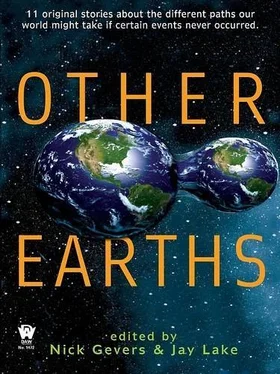His aide comes up and whispers that the rebels have detonated a bio-mass bomb in New York City, which is now stewing in a broth of fungus and mutation: the nearly instantaneous transformation of an entire metropolis into something living but alien, the rate of change become strange and accelerated in a world where this was always true, the age of industrialization slowing it, if only for a moment.
“There are no people left in New York City,” his aide says. “What are your orders?”
He hadn’t expected this, not so soon, and it takes him seven minutes to recover from the news of the death of millions. Seven minutes to turn to his aide and say, “Call in a nuclear strike.”
>>> …and his aide comes up to him and whispers in his ear, “It’s time to go now. They’ve moved up another meeting. Wrap it up.” Health insurance is on the agenda today, along with Social Security. Something will get done about that and the environment this year or he’ll die trying …
>>>He’s sitting in the chair reading the book, and he’s gaunt, eyes feverish, military personnel surrounding him. There’s one camera with them, army TV, and the students are all in camouflage. The electricity flickers on and off. The schoolroom has reinforced metal and concrete all around it. The event is propaganda being packaged and pumped out to those still watching in places where the enemy hasn’t jammed the satellites. He’s fighting a war against an escaped, human-created, rapidly reproducing intelligent species prototype that looks like a chimpanzee crossed with a Doberman. The scattered remnants of the hated adept underclass have made common cause with the animals, disrupting communications.
His aide whispers in his ear that Atlanta has fallen, with over sixty thousand troops and civilians massacred in pitched battles all over the city. There’s no safe air corridor back to the capital. In fact, the capital seems to be under attack as well.
“What should we do?”
He returns to reading the book. Nothing he can do in the next seven minutes will make any difference to the outcome. He knows what they have to do, but he’s too tired to contemplate it just yet. They will have to head to the Heartland and make peace with the Ecstatics and their god-missiles. It’s either that or render entire stretches of North America uninhabitable from nukes, and he’s not that desperate yet.
He begins to review the ten commandments of the Ecstatics in his mind, one by one, like rosary beads.
>>>He’s in mid-sentence when the aide hurries over and begins to whisper in his ear—just as the first of the god-missiles strikes and the fire washes over and through him, not even time to scream, and he’s nothing any more, not even an ossuary.
>>>He’s in a chair, wearing a suit with a sweat-stained white shirt and he’s tired, his voice as he reads thin and raspy. Five days and nights of negotiations between the rival factions of the New Southern Confederacy following a month of genocide between blacks and whites from Arkansas to Georgia: too few resources, too many natural disasters, and no jobs, the whole system breaking down, although Los Angeles is still trying to pretend the world isn’t coming to an end, even as jets are falling out the sky. Except, that’s why he’s in the classroom: pretending . Pretending neighbor hasn’t set upon neighbor for thirty days, except with guns, not machetes. Bands of teenagers shooting people in the stomach, the head, and laughing. Extremist talk radio urging them on. A million people dead. Maybe more.
His aide comes up and whispers in his ear: “The truce has fallen apart. They’re killing each other again. And not just in the South. In the North, along political lines.”
He sits there because he’s run out of answers. He thinks: In another time, another place, I would have been a great president.
>>>He’s sitting in the classroom, in the small chair, in comfortable clothes, reading the goat story. There are no god-missiles here, no viruses, no invasion. The Chinese and Russians are only on the cusp of being a threat. Adepts here have no real far-sight, or are not believed, and roam free. Los Angeles is a thriving money generator, not a husked-out shadow.
No, the real threat here, besides pollution, is that he’s mentally ill, although no one around him seems to know it. This pale, vacuous replica has a head full of worms, insecurity, and pure, naked, selfish need. He rules a country called the United States, squandering its resources, compromising its ability to function with greed and corruption.
When the aide comes up and whispers in his ear to tell him that terrorists have flown two planes into buildings in New York City, there’s blood behind his eyes, as well as a deafening silence, and a sudden leap from people falling from the burning buildings to endless war in the Middle East, bodies broken in blood and bullets and bombs. The future torques into secret trials, torture, rape, and hundreds of thousands of civilians dead, two million people displaced, a country bankrupted and defenseless, ruled ultimately by martial law and generals.
He sits there for seven minutes because he really has no idea what to do.
* * *
…and his fate is to exist in a reality where towers do not explode in September, where Islamic fundamentalists are the least of his worries.
There is only one present, only one future now, and he’s back in it, driving it. Seven minutes have elapsed, with a graveyard in his head. Seven minutes, and he’s gradually aware that in that span he’s read the goat story twice and then sat there for thirty seconds, silent.
Now he smiles, says a few reassuring words, just as his aide has decided to come up and rescue him from the yawning chasm. He’s living in a place where they’ll never find him, those children, where there’s a torrent of blood, and a sky dark with planes and helicopters, and men blown to bits by the roadside. Cities burn, and the screaming of the living is as loud as the screaming of the dying.
He rises from his chair, and his aide claps, encouraging the students to clap, and they do, bewildered by this man about whom reporters will say later, “He doesn’t seem quite all there.”
An endless line of presidents rises from the chair with him, the weight almost too much. He can see each clearly in his head. He can see what they’re doing and who they’re doing it to.
Saying his goodbyes is like learning how to walk again, while a nightmare plays out in the background. He knows as they lead him down the corridor that he’ll have to learn to live with it, like and unlike a man learning to live with a missing limb: a multitude of phantom limbs that do not belong, that he cannot control, but are always there. And he’ll never be able to explain it to anyone. He’ll be as alone and yet as haunted as a person can be. The wall between him and his wife will be more unbearable than ever.
He thinks of Peter’s pale, wrinkled, yearning face, and he knows two things: He’s going to make them release the man, put him on a plane somewhere beyond his country’s influence, and then he’s going to have them destroy the machine and end the adept project. Beyond that, he knows nothing and everything.
Then he’s back in the wretched, glorious sunlight of a real, an ordinary day, and so are all of his reflections and shadows. Mimicking him. Forever.
THE UNBLINKING EYE
Stephen Baxter
Under an empty night sky, the Inca ship stood proud before the old Roman bridge of Londres.
Jenny and Alphonse, both sixteen years old, pressed their way through grimy mobs of Londres. As night closed in, they had slipped away from the dreary ceremonial rehearsals at Saint Paul’s. They couldn’t resist escaping to mingle with the excited Festival crowds.
Читать дальше












